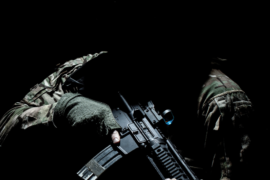HE EXPECTED TO SEE HER, IN A WILD DRAPE OF FISHERMEN’S NET, her mouth open for air, like the koi carp that ran up to you where large carp were stocked in a small place, kept as pets, their mouths open for the frequent treat of food; or a beautiful confused blue fish Wolcott who’d impregnated her had caught then thrown back into the gigantic moat called the Atlantic ocean, because he was busy with an English another.
Increasingly, this was what he knew had happened, that she had become the dissolved figure of the former girl, the dead-fish placeholder for whoever took her place, the memory of unimportant movements. The clock whose click and tick had not been reassuring, or only reassuring and not inspiring, with a dial and a functionary moving progressing noise its tick that neither put one to sleep or reassured: it was merely put up with till it failed in some way or a better clock nudged it out of way and out of sight. One moon cycle replaced by another.
His mother’s indignation, her knowledge was that among men another meant the death politics of substitution. Even James knew that, James who was avoiding women till the mystery of his mother and the country he lived in now, Great Britain, were greatly solved.
Outer space set him somewhat free from that, gave him the sense his mother had another (and literally, deeper, more poignant, far-ranging option). Science fiction, they called it. That escape refuge. Seance fiction it was to James, though he never breathed these two words together aloud, to any other. It would have been like telling a woman he loved her, when his long-gone mother’s body in the morgue seemed still to be asking why, what had she been for, what was the next woman’s body for, and where would it go when he was done? What storage that did not store? Would he do that to another? Use her? Why, what for? For a pleasure like licking a peanut butter spoon? A good heavy meal? Or a good sleep? She had been so disregarded he wanted no woman till he solved the crime, the casting aside, of his mother. To love another woman—would have been to trundle another body like a hostage to doom. He supposed sometimes they guessed him queer. They shouldn’t bother with the word gay; so much about him was morose.
No psychologist in the world could untangle the image he had of himself: twelve years old wandering like a trapped turtle in a London botanical garden with aunt Dorrie, at the high clock booming hour when his mother died in a taxicab slowly crossing London. He’d failed to be with his mother as she died in her own terrarium, beside the small glass windows of a London cab. He and she and aunt Dorrie had come all the way from America to go to a funeral: Wolcott’s. He didn’t know Wolcott was his father. Then.
Don’t you have a girl yet, they said, as each decade went by, working at the university. The decades were ticking by, becoming a stacked and layered cake.
A girl doesn’t have me, he would say, remembering aunt Dorrie’s description of tea, if they wouldn’t have tea, tea would have them; remembering how his mother had been had, but never herself had the blessings of love. Unless you counted he himself, James, her offspring, as some great plum prize.
Sleep was cure. Recurring dreams: making anyone feel such a sick-swoon of sleepiness you might go for a coffee with sugar or multiple cups of hot tea with thick cream to cancel their spells or curses.
Change the words to dreams that would sometimes happen. Again.
If your dreaming mind was a person, it would be wholly unreliable, changing its focus, its signature, its photo albums and its wardrobe whenever it felt like changing and with no practical limitations of budget. A too-eager actor, he thought, he knew was true. Someone desperate for roles, trying for roles no one should give him, because he never finished the job, just dwindled in it till he became, as the British say, redundant, which means don’t ask, he’s ashamed already he lost his job. Redundant supposedly made it sound as if it was no one’s fault, neither employer’s or employee’s. Just festering bad luck.
Or, maybe there were practical limitations of budget, then their excuse is they have run out of clothes, or outfits.
This was the case with James’ dream-actors: they waited a decade, then moved on—new productions. The decades ticking, unreliably, by.
The dream outfit of childhood: that geography of crossing ravines, gorges, canyons, miles of ground, from high above, sweeping across the sky on rope swings hundreds of feet deep in their drop, declaring to all watching he would not faint, he would not fall. Watch me, he could do this, make your bets, he would save the world. He was a circus artist, a performer, a daring man. The world watched. He had swung on a rope across the ocean: from America to here.
Twenties: dreams of flapping blackness, escape into places he never woke up in, so he never knew what was happening there; falling, falling into dark. Canoe trips which led to caves, caves which led to darkness and lightness and fear.
Thirties, matched sets: dreams of hiding in casserole dishes with jug-eared handles like Dopey’s ears, lurking in pale white pots made for Cordon Bleu school of cookery, hiding in jugs that looked like one the crow had filled with pebbles in Aesop’s fables. He was afraid—of this new country. Afraid he would do something wrong. There was the story of the boy who had hidden in a large jug, somewhere, in a palace, when a monster came in: consumed all others but he who had hidden in a jar. That large quiet jug, which was somewhat like a university post, the University of London, was safe; his mother had told him the magic words keep to small.
Forties ensembles: more dreams of bridges, waterfalls, landmass, dreams of a girl he had fallen in love with in an absolutely solitary way, from a distance, soon after he arrived in England. She never knew. She whose name began with L told him in the dreams all the things he had needed her to say, except she loved him. These words would have ended the dreams, so she politely kept these to herself. But by the end of his forties he was knowing she had never felt what he felt and he had been wise to never tell her. He had merely dreamed her. Out of need. He loved the letter L.
Fifties, dreams of all the women who had rejected him, ever, all asking where had he gone, all fantabulized by his dream-drummer’s imagination, because it was he who had at the first rejected them. But could he save them now? Could he save them from the dejection and the hated feeling his own mother had had and kept in herself like a rude but invisible cancer? By avoiding them? Yes. But even if he looked for the long rope swing of his early childhood dreams and all the thousands of people once watching him and hoping he might be the one to save the world, because he was the only rope-swinging one who could faultlessly sit without falling on the swing of the greatest trajectory any one had ever known, it was now gone. Or they were gone; gone to some dangerous arcing saviour-fool’s dream of their own, ended up lost in a popcorn bowl or fallen behind a bookshelf, into things, the blistered surrealist truth of objects, what you woke up and saw. Things. Symbols and real things too.
Next, your friends, your sixties, your long railroad dreams of numbers, and numbers only: the numbers of pages in his manuscripts, the numbers of dead that year he’d read about in train accidents versus the numbers of dead from planes crashed into mountains whose pilots had not seen the mountain till it was too late; the numbers of obituaries read that year by accident versus those by deliberation. The ratio of those numbers senselessly computed with other numbers, such as how many guessed eggs were in the wicker basket in the refrigerator or how many extra packets of shoelaces always the wrong size for his shoes he owned. The number of sons he had: two. It was only that number that soothed him and did not endlessly rattle around in his dream. Two. Two sons. A left road, a right road, everyone else left behind, except a number, the world’s only real number, exactly how many leaves are on trees at this very moment. The exact number, please, take a guess; or if that one is disturbing you as fans waving programs at you to distract you from making a pure perfect free throw—now that was an American thought—disturb you, all that movement, try another. Exactly how many drops of water are there in the world? Exactly how many leaves on how many trees? At this moment?
Now, sad trees and humans of the dreaming world almost fully assessed, your seventies, and here comes—the quiet. No dreams at all. Or, as the sleep-séance scientists insisted, many dreams but no memory of dreams. Unless your waking moments include them, and they are like the suddenly-opened helicopter door. You hope the ground is beneath your feet; you hope the helicopter is sound. You pray for levelness. Good shoes. No rain. That the rotor blades are taller than your head. You own now only the exit from dreams resolutely kept secret from you; death and your brain are fighting for who owns you.
Most likely death has been buying out your dreams. You are still you, but there is a reverse mortgage already on your dreams. Death owns them like the Monopoly board owns its players, more than the players own the homes. It will all roll away when the board’s folded up. Scientists meanwhile tell you you have dreams, you simply wake at the wrong time to know them. Should one believe the scientists?
Or are they only lulling you toward that open helicopter door where you stand not free as you think you are but blindfolded, telling you nothing to fear, only a dream—while death is one simple step ahead of you, its rotor blades high but a cliff below you—as you stand too defiantly tall and proud—as sleep has made you—stupid.
This time, no rope swing to save you, or the world; no crowd all with their hands pressed round their faces to cover their eyes if you fall and fail them all. No girl you loved, no girls you failed. To fail now is exceedingly normal.
Leap quickly to your progeny; have thoughts of them. Three sons, but one was a fully failed adoption. (Enough said.) Two other sons, also adoptions. One died young, cancer, after criss-crossing the world collecting academic degrees, all for no real purpose except collection. He had admitted it was true, the collecting. Like a golden keychain of collection his oldest son had shone, handy and compact and surely someday useful in the world, while within him cancer amorphous creeping and glue-like had travelled in him like lagoons of Venice. He had died on that awful gondola cancer sent you, half-in life and half-out, leaving a wife who was also collecting degrees which also would not save her if such a gondola arrived for her.
A chaste high spot was chosen for the funeral by his son’s wife, a mountain place known for a kind of high-flying bird that lived in crags in sides of the mountains. The minister who spoke said his son was nesting forever there, with those birds. The son had never had a child; he was too busy with tuition.
The other son, still living, was like a cave dweller of London: Gavin.
Gavin’s household was cluttered and very near the house James had inherited by hook and by legal crook from Wolcott, after parentage was proven. Gavin seven streets away roomed with too many, people constantly shifting, multiply jobbed. Gavin had begun university, then stopped. He’d seen the success and the futility of his father, brother. But, unlike his brother, he never much wanted to go. Gavin most of all wanted to find his mother.
Never having lived anywhere in his memory but London—except his earliest baby years when his mother-nameless had not yet turned him over for someone else to find in the sea of life—a few hours’ north and west, in the lustreless town of Leeds—Gavin nevertheless seemed to be waiting always for real parents to turn up, one of those children who cannot rest until they track them down, or are tracked down by them. In Gavin’s mind, no doubt, James was a terribly lucky one; James knew his mother’s face, knew all the things even the memory of the sound of a person’s voice tells you.
Gavin, and his now-gone brother, both, found themselves in the ocean, thrown back in by their mothers, ready to be rescued by James who had failed his mother and needed—to rescue someone. The oldest son moved far away to forget he’d been sent to sea; colleges had helped him do that. But Gavin had sensed the recognizing magnet that was his mother or father, wanted shoreline pull—some mother long looking for him in the estimable magic of moontown. He knew she was here, he kept saying. He knew she was here, in moontown.
This was the meaning, though many people did not know it, of London, the loneliest and most hopeful and beautiful of city names, like a blue fish with its mouth open: Moon Town.
REBECCA PYLE is a short story author (Map Literary, Wisconsin Review, Remembered Arts Journal); an artist (Tayo Magazine, JuxtaProse, Hawai’i Review); an essay writer (Muse/A Journal, forthcoming), and a poet (Forbidden Peak Press, Penn Review, Twyckenham Notes). Rebecca has lived the past dozen or so years in Utah, most of those years in an old brick house The Salt Lake Tribune’s telegraph operator lived in with his family a hundred years ago. See rebeccapyleartist.com.
Like what you’re reading?
Get new stories or poetry sent to your inbox. Drop your email below to start >>>
OR grab a print issue
Stories, poems and essays in a beautifully designed magazine you can hold in your hands.
GO TO ISSUESNEW book release
We’re thrilled to release our first novel into the world. Alligator Zoo-Park Magic by C.H. Hooks has been called “A new spin on the mystical, mythical south.”
GET THE BOOK



